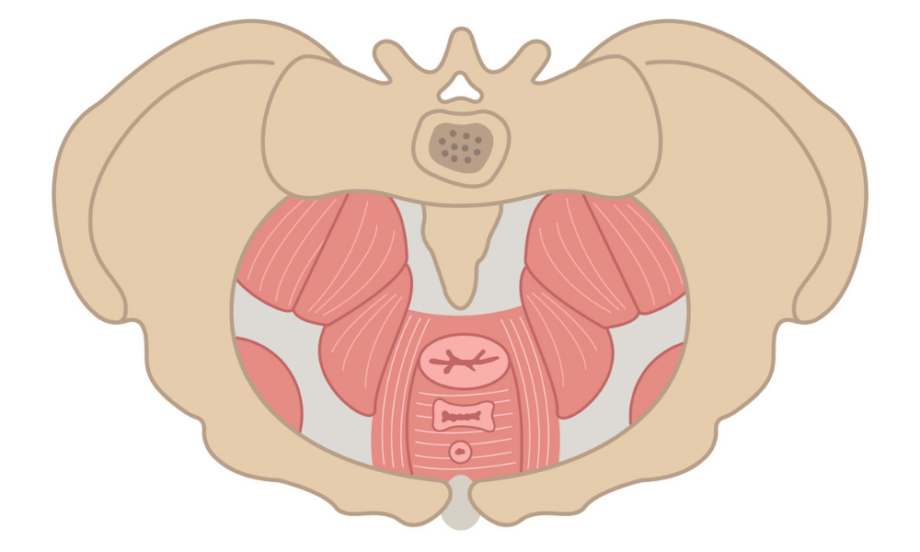The glorious pelvic floor has received a lot of attention on social media in the last few years with the rise of wellness culture. Accounts like @vaginarehabdoctor, @pelvichealth, @pelvicpaindoc, and @pelvichealthsf are trailblazing the out-of-office education movement on sexual dysfunction and pelvic pain for people who feel mistreated and gaslit by their doctors and previous healthcare providers. Plus, due to the increase in information and treatments for menstrual pain and cycle-related hormonal imbalances, people with access to social media are understanding chronic pelvic pain more now than ever.
A pelvic health influencer in her own right, Dr. Rachel Gelman, PT, DPT, pelvic floor specialist and owner of Pelvic Wellness & Physical Therapy in San Francisco, sat down with me for a conversation about the pelvic floor.
Lauren Cuevas: What is the pelvic floor?
Dr. Gelman: The pelvic floor is a muscular bowl or hammock inside of the pelvis. It’s important for a variety of reasons. For one, it is one of the true core stabilizers, so it helps us stay upright. It is involved in continence, allowing us to start and stop the flow of urine, as well as feces. It has a role in sexual function, so it helps obtain and maintain erections, clitoral and penile erections, as well as orgasm. It also plays a role in the lymphatic system, so it almost acts like a pump, and then, it helps support our pelvic organs- so bladder, uterus, prostate, and colon.
LC: It’s a big job that this pelvic floor has!
Dr. Gelman: Yeah, it has a big job.
LC: What should everyone know about the pelvic floor?
Dr. Gelman: Oh man! A lot of things. I’d say the biggest thing is that it’s constantly working. Since it’s supporting these organs, it’s playing a role in postural stability; it’s doing a lot. It doesn’t necessarily need to be exercised specifically, unless you are instructed to do so, otherwise any type of exercise is going to engage those muscles. Staying active, doing some sort of exercise is automatically going to work the pelvic floor. People get really focused on pelvic health and the pelvic floor instead of thinking about how whole body health is going to be beneficial for the pelvic floor, so staying well hydrated is going to be important because that is going to make your bladder happy, and that lives in your pelvic floor. Staying well hydrated is going to help decrease constipation, and the colon lives in the pelvic floor. There are a lot of things like that that are good for overall health that are going to help your pelvic floor. Instead of getting hyper focused on - oh you need to be doing Kegels - which can sometimes be beneficial for some people, it's really about just focusing on good overall health: good sleep, eating a good diet, staying hydrated, exercising. Those things are going to be just as beneficial for the pelvic floor.
LC: Thank you! What are some things you wish people who come to see you knew about the pelvic floor?
Dr. Gelman: Yeah, there is this idea that it's only a person who has a vulva or vagina coming in, when about half of my patients have a penis. People can develop issues with their pelvic floor who have never been pregnant, who are young, who don’t have a vulva or a vagina, so there are a lot of reasons someone may need to see a pelvic floor therapist. The other thing is the concept that everyone assumes, which is when they hear pelvic floor they immediately think Kegels and majority of people - or at least from my work - end up having tense, guarded, or overactive pelvic floors, and we really need to work on relaxing those muscles, too, so that they are not so hyper engaged.
LC: Yeah, that resonates with me. I am really interested in becoming a pelvic specialist for survivors of sexual trauma and oftentimes when I bring this up to people they are lost at the connection between pelvic floor therapy and survivor work. On that note, my last question is, how does the pelvic floor impact sexual function?
Dr. Gelman: A lot of ways! So, what happens during arousal is that pelvic floor muscles relax, so if we think about vagina, there needs to be some relaxation of the pelvic floor muscles if someone is going to be having penetrative sex, so something can enter the vagina. Those muscles contract because the clitoris gets engorged with blood, or the penis gets engorged with blood, then these muscles contract to maintain an erection. Then during an orgasm, these muscles rapidly contract, relax, contract, relax, so they play a big role in all of that. If we think of the flipside, what happens when these muscles become dysfunctional? If these muscles are tense, guarded, spasmatic, that can lead to things like pain with penetrative sex, pain with orgasm, pain with arousal, pain with erection, pain with ejaculation, pain after intercourse, or pain after any sexual activity. That’s where having these muscles be healthy and be able to move fully is going to be helpful versus if these muscles have become dysfunctional in some manner that could lead to a variety of sexual dysfunction.
A Little More About Pelvic Floor Dysfunction
The pelvic floor does not have a hard bottom, it is a bowl or hammock of muscles that holds up our organs.
The pelvic floor muscle group can be tightened and relaxed similar to other muscle groups. As Dr. Gelman said, it's common for patients to come in with an overactive or hyper-engaged pelvic floor. This is because the pelvic floor can hold trauma - and therefore tightness - from being in a fight-or-flight state due to anxiety, stress or inactivity.
Humans have two nervous system responses that work together to maintain homeostasis. These two nervous system responses can occur without us knowing, they are natural processes that connect the brain’s reaction to our body’s action. The sympathetic nervous system responds to dangers or threats by preparing the body for action and defense, whereas the parasympathetic nervous system regulates emotions to reach a calm, relaxed state. The sympathetic nervous system is engaged when a person is actively experiencing trauma and it can stay in this heightened state for long periods of time after the trauma occurs, because the body may still think it is in danger. This is why pelvic floor dysfunction directly correlates with sexual trauma, and can manifest in symptoms like vaginismus or burning sensation with penetrative sex. The tightness caused by the sympathetic nervous system response can even cause recurring urinary tract infections in people because the overactive muscles irritate the urethra.
Like many parts of our body, the pelvic floor exists to protect us, so when our brain feels like we are in danger or we are not fully comfortable in the situation, the pelvic floor muscles will tighten, leading to uncomfortable sex. This is why ongoing consent throughout intimacy is so important to the physical experience of sex itself.
Read: How Sex Toys Can Help You Reclaim Your Sexuality After Sexual Assault
Oftentimes, people may practice breathing exercises that allow the pelvic floor to relax and release tension before having sex. Pelvic floor physical therapy can also address these sensations.
Pelvic floor therapy can also help people with endometriosis or fibroids understand their chronic pain. Pelvic floor specialists can create a physical therapy plan that allows the patient to understand what specific relaxation techniques and exercises help to alleviate their unique pain.
When to See a Pelvic Floor Physiotherapist
You’ll know you need to see a pelvic floor specialist when:
- Your pelvic pain due to menstruation is acute and unbearable.
- You pee when sneezing, laughing, or coughing.
- You experience pain or a burning sensation frequently during or after sex.
- You are experiencing vulvodynia, chronic pain of the vulva and the vaginal opening.
- You are unable to insert anything inside of your vagina.
- You are unable to have or maintain an erection.
- You are experiencing bowel movement issues (after consulting with a primary doctor or gastroenterologist first).
- You are experiencing recurrent urinary tract infections or pain with urination.
Your physical, psychological, and social health and well-being contribute to your pelvic health. Maintaining a healthy physical lifestyle by doing daily movement you enjoy, drinking water, breathing deeply, surrounding yourself with people who care for your health and safety, and making sure to honor and love yourself, are all tools to ensure your pelvic floor muscles are able to hold you up, let you excrete and give you pleasure.
Lauren (Lo) Cuevas (they/she) is a Filipino social science writer, researcher, educator and artist with four years of experience writing on gender and sexuality topics. Their academic research is diverse, covering topics in queer anthropology and neuroscience. As a disabled writer, Lo's writing approaches sexuality and kink from an intersectional perspective. Topics about which Lo is passionate include indigenizing sexuality education, menstruation education, Endometriosis awareness, pelvic floor therapy, queer films, the importance of lube and all things kinky sex. Lo is also a professional photographer and documentary filmmaker. You can listen to their podcast on Sikolohiyang Pilipino or check out their photography and documentary films via their portfolio website. You can also contact Lo directly at [email protected].




